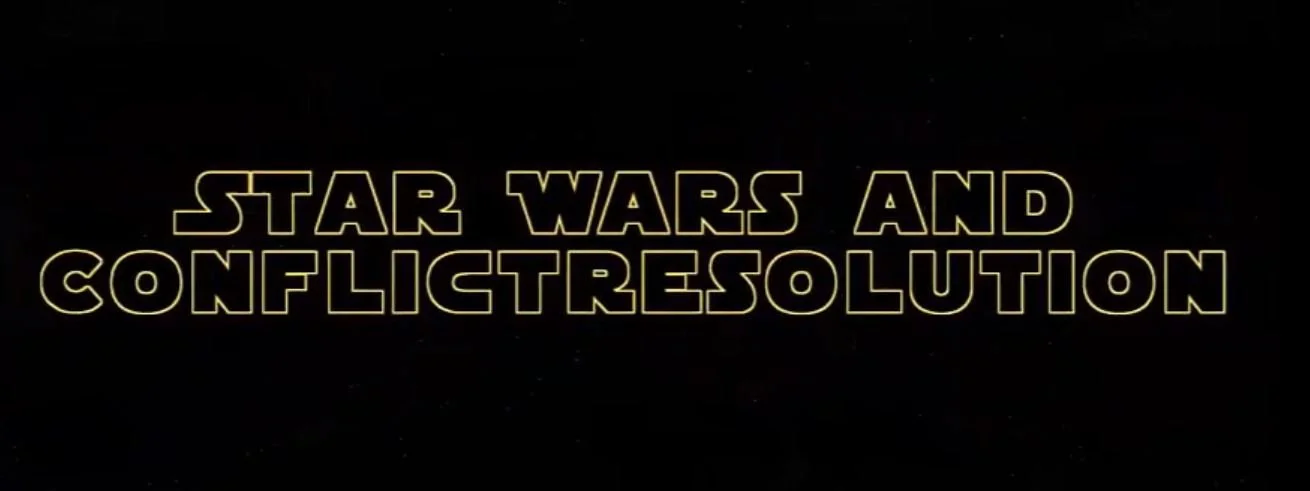
CALL FOR CHAPTER PROPOSALS
Star Wars and Conflict Resolution: Episode II
Editors: Noam Ebner (Creighton University) and Jen Reynolds (University of Oregon)
What’s more Star Wars than a sequel?
Building on the success of Star Wars and Conflict Resolution: There Are Alternatives to Fighting, we seek proposals for chapters in a second book combining the knowledge and science of the negotiation and conflict resolution field with the rich narrative universe of the Star Wars movie saga.
The book (working title, of course: Star Wars and Conflict Resolution: Episode II), will be an edited collection of essays by conflict resolution experts in academia and practice.
Goal: Like the first book in the series, Episode II’s purpose is sharing the conflict resolution field’s insights and knowledge with the general public, ranging far beyond those finding their way to our classrooms. Pop culture opens a gateway to this audience, and Star Wars provides a particularly forceful (!) vehicle to drive through it: it is one of the most widespread cultural phenomena of our time, and conflict and its resolution are central to all of its narrative themes. Episode II will continue to bring the conflict resolution community’s intellectual weight and signature trait of playful creativity to bear on Star Wars. Beyond reaching a wide audience, this substantively rich book, written in a light, humorous tone and animated by passion for conflict resolution and for Star Wars, will invigorate the conflict resolution field, diversify its educational materials, and generate new ideas for conflict and negotiation research in our own galaxy.
Topics: You may choose any conflict resolution topic, method of inquiry, and scope of exploration you like. Conflict resolution themes that recur in the Star Wars narrative include conflict contexts, relationships, negotiation, conflict interventions, ethics, process, decision-making, and system design, to name but a few. For example, you might propose to:
· Analyze one scene through a single conflict prism (e.g., “The role of attribution in Obi-Wan’s final encounter with Anakin”).
· Explore one concept through multiple situations from across several movies (e.g., “Use the (BATNA) Force: How to win at space chess or alter an Ewok village’s dinner menu”).
· Conduct a case study (e.g., “Search your feelings, Father”: Negotiating Darth Vader’s turn to the light”).
· Illustrate an entire model via a series of scenes (e.g., “R2-D2 and C-3PO Get to Yes”).
· Unpack a single line from the films within the broader context of social and political identities today (e.g., Yoda: “Wars not make one great”).
The first volume provides excellent examples of the wide range of potential possible perspectives.
Star Wars material: As the book aims to harness widely familiar material to conflict resolution topics, chapters should primarily relate to topics, characters, and scenes from the Star Wars movies. Other material (TV shows, books, cartoons, videogames etc., canon or non-canon) can be referenced, but should not be central to the chapter. (We hope to center future volumes on material beyond the movies, particularly the live-action TV shows and animated shows. You are welcome to share your interest in participating in this kind of project with us in the future.)
Movie/Trilogy focus: At this point, our plan is to organize Episode II around trilogies: the Original Trilogy (A New Hope, The Empire Strikes Back, and The Return of the Jedi); the Prequel Trilogy (The Phantom Menace, Attack of the Clones, and The Revenge of the Sith); and the most recent Sequel Trilogy (The Force Awakens, The Last Jedi, and The Rise of Skywalker). To fit chapters to this model, each chapter should be centered around elements and examples from a single movie or, at most, a single trilogy. While the very occasional reference to another trilogy can be made, chapter proposals drawing on material from all across the saga are discouraged for this volume (although you are welcome to send us your proposal for such a chapter to keep on file). Proposals can also focus on the Solo and Rogue One movies. When designing your proposal, consider how you will address the topic you have chosen within the frame of a single movie/trilogy. We’re happy to consult.
Style and tone: This is a book for non-academics, not a scholarly tome or a law review. Authors should minimize use of jargon, and humor will be appreciated. We will provide further details on content and style after acceptance. For easy reference on these issues, check out our previous book, Star Wars and Conflict Resolution.
Timetable: First drafts of chapters included in the book will be expected in mid-summer. More details will be provided later on.
Submission guidelines: Chapter proposals should be 500-1000 words in length. They should detail the conflict topics, concepts, frameworks and/or tools you intend to address, and the scene/s or movie or trilogy you plan to explore and/or use as examples. If you have a high-level idea (“I’d like to discuss C-3PO as a shiny golden mediator”), for example, please provide this idea and then give 8-12 points you plan to explore in the chapter, along with the scenes or dialogue that support them. Proposals should show that you’ve thought the chapter through and have a clear initial framework in mind. We’re happy to consult on developing your proposal. Co-authorships are welcome.
Please send your chapter proposal, along with your short bio or CV, to Noam Ebner (noamebner@creighton.edu) and Jen Reynolds (jwr@uoregon.edu), by March 1, 2023. Feel free to reach out to us with any questions.
May the Force be with us all!
